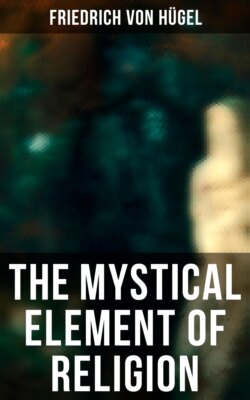Читать книгу The Mystical Element of Religion - Friedrich von Hügel - Страница 15
На сайте Литреса книга снята с продажи.
7. This seems especially to apply to the Intuitive-Emotional element of Religion.
ОглавлениеAnd if the prima facie trend of centuries of thought and conflict appears to rule out of court even such a fringe of individual experience and emotion as ever accompanies and stimulates all religion: the verdict of history, indeed of any survey of contemporary life, if only this be sufficiently large, would seem fatal to any type of religion in which this individual experience and emotion would form religion’s core and centre, as in the case of the specifically experimental-emotional school generally, and of the Mystics in particular.
To take some such survey, let us look, to begin with, outside of where Catholic discipline and unity somewhat obscure, at first sight, even the legitimate and indeed the really existing diversities of school and tendency. In the Church’s organism each divergence has ever been more largely tempered and supplemented by the others; and since the Reformation, indeed in part even more recently, owing to an entirely intelligible and in part inevitable, reaction, even most legitimate and persistent divergencies, which flourished in rich and enriching variety throughout the Middle Ages, have largely ceased to appear in any obvious and distinct embodiments. Let us look then first to where such diversities grow unchecked, and indeed generally tend to excess and caricature. Let us take contemporary English Protestantism, and then Foreign Protestantism in the large lines of its history. In both cases the experimental-emotional strain and group will seem to compare unfavourably with its competitors.
For if we look about us in England, we seem to have little difficulty in classing the tendencies within the Established Church under the headings of High, Broad, and Low; indeed we can readily extend this treble classification to all the various schools and bodies of English Protestantism. We can easily conceive of the greater portion of English Nonconformity as but a prolongation and accentuation of the Evangelical school in the Established Church: the readiness and ease with which the former at certain moments unite and coalesce with the latter, show quite conclusively how close is the affinity between them. We almost as readily think of the Unitarian and Theistic bodies as prolongations and further sublimations of the Anglican Broad Church view, though here, no doubt, the degrees and kinds of difference are more numerous and important. And if it would be hard to find an extension, still more an accentuation, of the Anglican High Church party amongst the English Nonconformists, a strain largely identical with the sacerdotal current elsewhere has always existed in the Presbyterian churches. Nor must we forget the powerful and constant, both repellent and attractive, influence exercised by Rome upon even those outside of her obedience. To be quite philosophical, the survey ought to include all types of English Christianity; and, in that case, the High Church position would rank rather as a dilution, as a variety, incomplete and inconsistent though it be, of the type represented most strikingly and emphatically by Rome, than as a variant of the types having their centres at Wittenberg and Geneva.
And if we next turn to German Protestantism, especially to the simultaneous variations of its short-lived, fluid, formative period, we shall there too find this treble tendency. The Evangelical strain will be represented here by the numerous Illuminist and Anabaptist personalities, groups and movements to which Luther himself had given occasion, which but emphasized or caricatured his own earlier Mysticism; but which, when they threatened, by their revolutionary, communistic fanaticism and violence, completely to discredit and ruin his own movement, he suppressed with such ruthless and illogical severity. And the Broad Church strain will here be found emphasized and caricatured in Socinianism, and in such milder forms of Rationalism as prepared the way for it or followed in its wake. And finally, the High Church strain is not so hard to discover in much of the doctrine and in some of the forms and externals of Orthodox, official Lutheranism. Indeed in foreign Protestantism generally,—in Zwinglianism, in Calvinism, and in its other bodies and sects, we can trace various forms of, and degrees of approximation to, one or other of these three types, the Historical, the Experimental, the Rational.
Now looking at the scene of battle, for the moment quite generally, it would seem as though, of these three types and tendencies, the Emotional and Experimental had proved itself decidedly the weakest for good, the strongest for evil of the three, and this both in the past and in the present, both in England and abroad. We have here in England, in the past, the Puritan excesses in Ireland, Scotland, and England itself; and later on and down to the present, the largely dreary and unlovely, narrow and unjust monotony of Evangelicalism. We have there abroad, in the past, the Peasants’ War and the Anabaptist Saturnalia at Münster; and later on and down to the present, that Pietism which has so often barred the way to a just appreciation of Historical Christianity and to a candid acceptance of rational methods and results, and this without its being able to find any constructive or analytic working principle of its own. Both in England and in Germany, indeed throughout the cultivated West, only the Historical, Traditional school on the one hand, and the Rationalistic, Scientific school on the other hand, seem to count at all: it is they which alone seem to gain ground, or at least to hold it, at the Universities and amongst the thinking, ruling classes generally.
